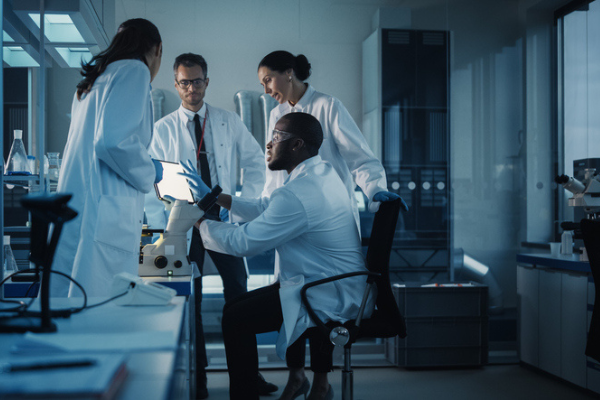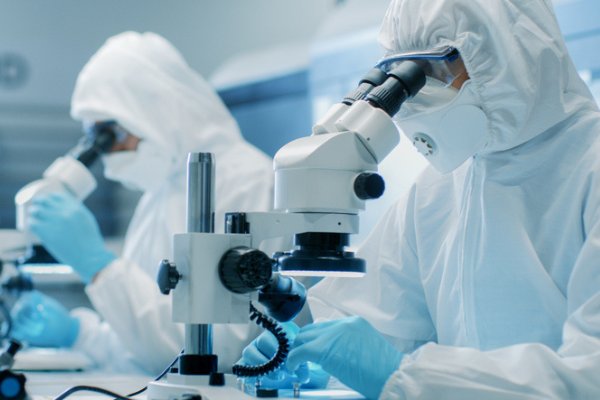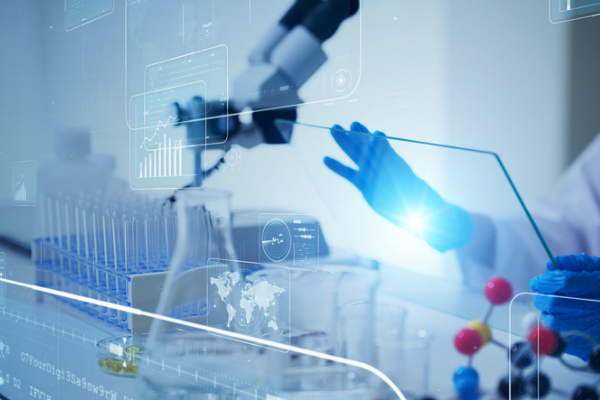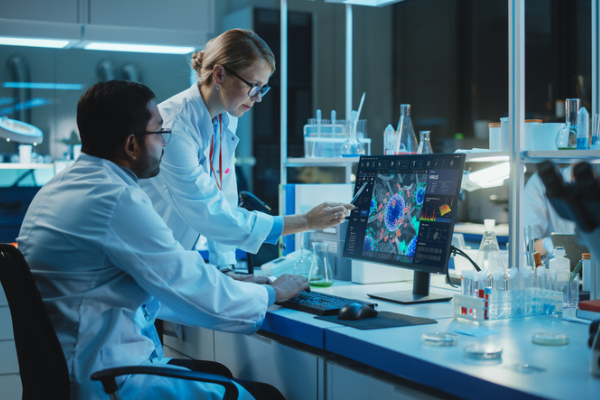
In October 2021, after working nine years in a chemical technical professional (CTP) role, you moved into a project leader role. How has the transition gone for you?
So far so good. It’s very different from the previous work I did. Not only did I change roles, but I also moved into a different department. So, I went from being the “go to” person to having to ask lots of questions. What I like about this role in particular is that I’m still doing lab work. I truly enjoy being in the lab and even as I progress in my career, I don’t see my desire to do lab work changing.
Regarding your new responsibilities, which one were you most prepared to execute against, and which one will require the most time to get up to speed?
I think I can say doing lab work would be what I was most prepared for. As a CTP you are the expert in the lab. The project leader heavily relies on your insights and conclusions since you are doing all of the lab work. I think where I require the most time getting up to speed is planning out a project and understanding the best way to present project data to the stakeholders.
I have taken on some leadership initiatives and have done some trainings and research on my own time and have presented at meetings and conferences, but it’s a little different when it becomes expected of you. Luckily, I have a good team and an excellent technical leader to help me get there.
Based on your experience, what are some behaviors exhibited by a high-performing supervisor?
The best supervisors I’ve worked with never made me feel like I wasn’t important. They would bring me in to the conversations and meetings. They would make sure I understood why I was doing the work in the lab. And once I became established as the “go to” person, they would often ask me for advice and my thoughts during the project planning. That is the kind of supervisor I would want to be.
What advice do you have for a CTP looking to follow in your footsteps, and make the transition to a project lead?
I think understanding what is expected of this role or any role you might be interested is key. I did a lot of research on this role before I went for it. I wanted to understand what was expected so I could take the time to work on the different skills needed to achieve my goal. I had several conversations with my leaders about it and made sure it was on my employee development plan. This way, with the help of leadership, I was able to identify opportunities to develop new skills. I also took it upon myself to step up in lab and take on additional responsibilities. I would also look for additional trainings like learning statistical software to better interpret the data I was generating. I also feel like networking and mentorship are very important as well.
Your career in industry started at United Chemical Technologies, Inc., a small company that called on you to wear many hats in your CTP role. Thinking back, what do you see as the pros and cons of starting one’s career with a small company vs. a large one, like Dow?
I think some of the pros at being at a smaller company is that you can get exposure to different things because you are expected to “wear many hats”. I was able to learn a lot at UCT and take on some responsibilities that I might not have been able to do at a bigger company.
For example, I was able to learn how to use several analytical instruments such as GC, GCMS, HPLC, LCMS, FTIR, NMR, etc. At a bigger company you might only be an expert on a couple of instruments because there is someone else who is an expert on other instruments.
Some of the cons of being at a smaller company are that you might be limited on career path opportunities. Also, some smaller companies can’t afford to spend as much money on research as bigger companies, so your resources may be limited. I think both types of companies have their values. I know in my case I was able to gain lots of skills and experience at UCT that helped me get an opportunity to work at Dow.
In your former role as a CTP, what daily tasks did you normally tackle as part of a typical workday?
My typical workday as a CTP would begin with going over the project plan for that day whether it was formulating, preparing samples, or testing. After completing my safety checks, I would start my lab work. If I had any questions about the project plan or if I saw any abnormalities, I would work with my project leader to find a solution and continue with the plan. Once the project was complete, I would analyze the data and send my results with my insights and conclusions to my project leader.
What’s the one thing you wish you had learned earlier in your career?
I guess I would say understanding how to take feedback. I think early in my career I would take certain feedback in a negative way. I have come to learn that all feedback is good feedback. We are constantly improving ourselves and no one is perfect. We have to learn how be self-aware and understand that there is always room for improvement. I have learned to understand what I need to work on, and focus on making those improvements.
Think about an early career CTP. What can you share to help advance in the workplace?
Ask lots of questions. Don’t be afraid to ask questions. I have learned a lot over the years from my colleagues. It’s better to ask then make a mistake. I also think networking and mentorship are important. I have had several mentors over the years, and they have really helped me to understand where I wanted to go in my career and how to get there.
How important is gaining new skills to achieving success as a CTP? Do you think it is better to be a self-learner, or were you a fan of taking additional classes/seminars to gain new skills?
I think it is very important in gaining new skills no matter your role. I have done both types of learning and I think both are valid. It’s nice working for a company like Dow that has lots of learning resources and encourage you to take advantage of them. I definitely think taking that extra initiative has helped me in my career.
At this point in your career, what is your thinking about the need to get an advanced degree?
I have considered getting my master’s degree in order to continue educating myself, and companies like Dow offer tuition assistance. I know colleagues who have done this, and it has helped them in their careers. I don’t think it is for everyone and depending on the company you work for it might be required for certain roles. I do think there is value in continuing your education, but there is also value in learning for your fellow colleagues.
What do you like to do with your time away from the workplace?
I’m an avid sports fan, and I love all of the Philadelphia sports teams. My biggest passion is soccer. I am of Portuguese heritage and soccer or futebol is a big part of my culture. I love FC Porto, which is my favorite team from Portugal, and I play soccer as well as the captain of the Dow Soccer team. I also enjoy eating all kinds of food and traveling. My wife and I have recently returned from Paris and it was amazing. I am also a big movie buff and love to just settle down and watch a good movie.
You have spent much of your life in the greater Philadelphia area. What do you like about it living and working there?
I was born and raised in Philadelphia to immigrant parents from Portugal. I love living in the Philadelphia area. There is so much history here being the birthplace of the United States. I love all of the different types of architecture we have in and around the city. We also have a great food scene. We are close to so many great things whether you want to go to the beach or up the mountains. We also have avid sports fans which I love. Come on, we have the Rocky statue!
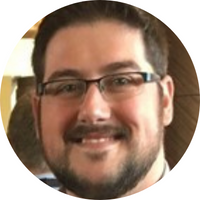
Dan graduated with a B.S. in Biochemistry from Albright College. After graduating, he developed new products and extraction techniques as an analytical technician at United Chemical Technologies (UCT). At UCT, Dan received his first publication in LC/GC magazine and the Best Poster Award at the 2012 Spring Symposium from the Chromatography Forum of the Delaware Valley.
Dan started at Dow in October 2012 as a contractor with Industrial Coatings. He became a full-time employee in February 2013 with Paper Coatings where he worked on projects for thermal paper, coated paper, and paperboard markets.
In December 2017, he moved into a Technical Service and Development (TS&D) role with Paper and became the applications lead for key customers. He was a key contributor for the Rhobarr barrier coatings platform, recognized with R&D 100 (2020) and Edison (2021) awards. In October 2021, he moved into a TS&D role with Dow’s Architectural Coatings segment as a Lead TS&D Specialist.
Outside of his projects, he is a member of the Safety team as the PPE Focal point. He has been an active member of the American Chemical Society and has been a member of the Committee on Technician Affairs since 2020.
He achieved the rank of Eagle Scout in the Boy Scouts of America. He is married to his beautiful wife Naticia, and his hobbies include playing soccer (as the captain of the DOW soccer team), keeping up with sports, and enjoying a good movie.
This article has been edited for length and clarity. The opinions expressed in this article are the author's own and do not necessarily reflect the view of their employer or the American Chemical Society.


